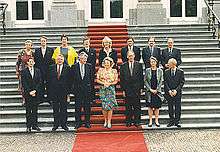First Kok cabinet

The First cabinet of Wim Kok (1994-1998), also called the "Purple Coalition" because of its social-democrat (red) and liberal (blue) components, was a Dutch government formed by the political parties PVDA, VVD and D66. D66 had won its greatest political victory with the slogan that the Christian Democratic Appeal should be in the opposition for a change. The desire to form a cabinet without the Christian Democrats was based on the pivotal role in the political center that the CDA played in Dutch politics. The CDA had been in government continuously since its formation in 1980, and at least one of its three antecedents had been in government since 1918.
The main aim of the cabinet was to create employment. GDP growth had been erratic in recent years. The aim of the cabinet was to increase the influence of markets in the economy, with policies of tax reduction, economizing and trying to keep people out of the social care by supporting employment. Large infrastructural projects were started. Another aim was to make an end to the enormous debt of the Dutch government.
The Treaty of Amsterdam was signed during this cabinet. The Srebrenica massacre occurred under the responsibility of this Government, which led later to the fall of the second Kok cabinet.
The cabinet started processes of liberalisation which were completed by the same coalition in the following cabinet: the legalisation of prostitution in 2000, same-sex marriage in 2001 and Euthanasia in 2002.
This was the last cabinet in recent history to serve a full term. Five of the following cabinets resigned and one was a temporary caretaker cabinet.
Ministers
| Prime Minister General Affairs | Wim Kok | PvdA | |
| Vice Prime Minister Interior Affairs | Hans Dijkstal | VVD | |
| Vice Prime Minister Foreign Affairs | Hans van Mierlo | D66 | |
| Justice | Winnie Sorgdrager | D66 | |
| Education, Culture and Sciences | Jo Ritzen | PvdA | |
| FInance | Gerrit Zalm | VVD | |
| Hans Wijers | D66 | a.i. June 4–26, 1996 | |
| Defense Dutch Caribbean and Aruba | Joris Voorhoeve | VVD | |
| Transport and Water | Annemarie Jorritsma | VVD | |
| Economy | Hans Wijers | D66 | |
| Agriculture, Nature Management and Fisheryj | Jozias van Aartsen | VVD | |
| Social Affairs and Employment | Ad Melkert | PvdA | |
| Public health, Wellbeing and Sports | Els Borst | D66 | |
| Housing, Spatial Planning and Environment | Margreeth de Boer | PvdA | |
| Development cooperation | Jan Pronk | PvdA |
State Secretaries
Please refer to the article on State Secretary (Netherlands) for an explanation about the function.
| Foreign Affairs | Michiel Patijn | VVD | |
| Justice | Elizabeth Schmitz | PvdA | |
| Interior Affairs | Jacob Kohnstamm | D66 | |
| Tonny van de Vondervoort | PvdA | ||
| Education, Culture and Sciences | Tineke Netelenbos | PvdA | |
| Aad Nuis | D66 | ||
| Finance | Willem Vermeend | PvdA | |
| Defense | Jan Gmelich Meijling | VVD | |
| Housing, Spatial Planning and Environment | Dick Tommel | D66 | |
| Economy | Anneke van Dok-van Weele | PvdA | |
| Social Affairs and Employment | Robin Linschoten | VVD | until 28 June 1996 |
| Frank de Grave | VVD | from 2 July 1996 | |
| Public health, Wellbeing and Sports | Erica Terpstra | VVD |
| Wikimedia Commons has media related to Cabinet Kok I. |